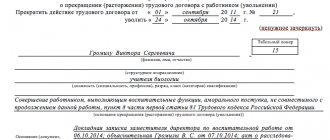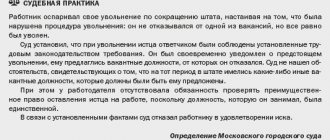What are disciplinary offences?
The concept of a disciplinary offense is given in Article 48 of the Disciplinary Charter of the Armed Forces of the Russian Federation. This normative act characterizes the presented concept as complete or partial failure to fulfill official duties, violation of public order or established discipline. A disciplinary sanction for committing a disciplinary offense is imposed only when there are no grounds for imposing administrative or criminal liability.
A military serviceman can be held accountable regardless of rank and status. It is also worth noting that an extremely important condition here is the presence of grounds for imposing the appropriate penalty; Simply put, a high-quality evidence base is mandatory.
Gross disciplinary offenses - what is it, legal regulation and laws
Issues related to the relationship between employees and employers in the Russian Federation are regulated primarily through the Labor Code. Labor discipline also relates to an area that is almost entirely covered by the provisions of the above-mentioned document. From a legal point of view, the following articles of the Labor Code of the Russian Federation are important:
- Article 3 clearly prohibits the use of forced labor for the purpose of maintaining or improving discipline or influencing employees.
- Article 6 places issues related to the types and procedure for using disciplinary sanctions within the scope of federal rather than regional legislation.
- Article 21 obliges employees to comply with the labor discipline adopted at the enterprise.
- Article 22 directly gives Russian employers the right to bring workers to disciplinary liability for offenses committed by them as part of their work.
- Article 66 presupposes the need to make entries about a disciplinary sanction in the work book, but only if it is a dismissal.
- Article 81 defines a list of legal grounds according to which an employee can be dismissed by the employer at the latter’s initiative. At the same time, the exact list of gross disciplinary offenses for which dismissal is permitted is also discussed in this article.
- Article 189 establishes the general principles of such a concept as labor discipline in the enterprise as a whole.
- Article 192 specifies disciplinary sanctions that are permissible from the point of view of legislation.
- Article 193 presupposes the establishment of a specific procedure according to which penalties for disciplinary offenses should be imposed on employees.
- Article 194 considers the possibility for an employer to remove a disciplinary sanction from an employee at its own discretion, and also contains principles for removing penalties over time.
Directly in the articles of the Labor Code of the Russian Federation on disciplinary sanctions and misconduct there is no definition of gross misconduct and no list of such. However, by gross misconduct in the general case we mean one that, according to Article 81 of the Labor Code of the Russian Federation, allows the employer to unambiguously and based on a single misconduct dismiss an employee.
Military misconduct
Disciplinary offenses are divided into subtypes (depending on their severity). The more serious the offense is considered, the more severe the punishment. Punishments are regulated by the Labor Code of the Russian Federation, since the entire military system is no different from the classic “employee-employer” scheme. At the same time, there are some other regulations that should also guide those liable for military service. These are various kinds of charters, regulations and other local acts.
The military leadership is responsible for imposing disciplinary sanctions. The unit commander makes decisions on the presence or absence of grounds for bringing the serviceman to justice. He also chooses the optimal measures of influence. Naturally, no one in the military sphere should go beyond the rules and norms established by law. The punishment for a particular offense must always comply with the Labor Code and the Military Regulations.
Types of offenses
We have considered what offenses are, but all of them can affect different areas of our lives and are committed in relation to, for example, administrative or civil norms. It is on this basis that the classification is built. The types of offenses are as follows:
- Disciplinary.
- Administrative.
- Civil misdemeanors.
- Immoral.
Most legal officials believe that any misdemeanor is the first step towards committing a crime, especially when the person has not suffered any punishment for committing it.
Let's look at the types of offenses in more detail.
The concept of disciplinary offenses and legal norms
The concept of a disciplinary offense and the procedure for holding an employee accountable for committing them are spelled out in the Labor Code in Art. 192. Also in this case, it is worth following Resolution No. 2 of the Plenum of the Supreme Court.
A disciplinary offense is an unlawful, guilty violation of labor or service discipline by an employee, for which disciplinary liability is provided. A disciplinary offense can be understood as an employee’s violation of the provisions of a job description, internal regulations or labor discipline.
In Art. 21, 189 of the Labor Code states the employee’s obligation to comply with these rules, and Art. 22, 191 provides for the employer’s right to reward an employee for the conscientious performance of his duties; Art. 22, 192, on the contrary, provides for punishment of employees if they fail to perform or perform improperly.
Also, on the issue of disciplinary offenses, it is necessary to take into account the provisions of Art. 81 of the Labor Code, which contains grounds for termination of an employment contract as a form of disciplinary action.
The possibility of simultaneously bringing an employee to disciplinary and financial liability is stipulated in Article 248 of the Labor Code of the Russian Federation. The duration of a disciplinary sanction is established in Art. 194 Labor Code of the Russian Federation. The maximum time limits given to the employer for penalties for committing a disciplinary offense by an employee are given in Art. 193 Labor Code of the Russian Federation.
The concept of disciplinary offense for certain categories of persons is specified in special laws. So, for example, according to Art. 28.3 Federal Law-76 “On the status of military personnel” it is not allowed to classify actions under orders and in necessary defense as misdemeanors.
Also, the internal regulations of the enterprise can be devoted to the definition and classification of offenses and the procedure for imposing penalties.
Types of labor disciplinary offense:
a) failure to conscientiously fulfill the duties of an employee or employer provided for in an employment contract; b) failure to comply with the internal labor regulations of the organization; c) failure to comply with labor discipline; d) failure to comply with established labor standards; e) failure to comply with labor protection and occupational safety requirements; f) lack of care for the property of the employer and other employees; g) failure of the employee to inform the employer or immediate supervisor about the occurrence of a situation that poses a threat to the life and health of people, the safety of the employer’s property
What is the definition of a disciplinary offense?
Article 192 of the Labor Code of the Russian Federation defines a disciplinary offense as failure to fulfill or incomplete, poor-quality performance of labor duties assigned to a citizen. Analysis of labor legislation allows us to identify the main features of a disciplinary offense:
- An illegal action is being committed that violates official or labor discipline.
- The employee's actions are his fault.
- Unlawful and guilty actions are subject to disciplinary liability.
In this case, the employee’s job responsibilities can be specified:
- labor legislation;
- local acts establishing internal labor regulations;
- instructions (job descriptions).
A disciplinary offense is always associated with the existence of an employment contract, which must stipulate the responsibilities of a working citizen. If his actions do not affect the provisions of the employment contract, such an offense can be excluded from disciplinary action. An employee who has received an order from management that violates the law has the right to refuse to carry it out. This is also not a disciplinary violation of labor relations.
If the employee did not fulfill the duties assigned to him, but his guilt was not established during the proceedings, it means that he did not commit a disciplinary offense.
There is no list of disciplinary offenses, as mentioned above. However, it is possible to identify certain types of such offenses and assess their severity. When imposing a disciplinary sanction, this criterion must be taken into account.
Types of disciplinary offenses
It is most important to determine whether there has been misconduct:
- intentional;
- without intent.
Example: an employee violated the order of technological actions in order to obtain the final result as quickly as possible and caused a defect. Another example: an employee committed the same violation with the same result intentionally, for personal reasons. It is clear that in the second case the punishment will be more severe.
In addition, the following offenses are distinguished:
- any employee who has entered into an employment contract;
- worker in a special field.
Certain categories of workers may commit offenses that have more severe and dangerous consequences. Their responsibility is regulated by special industry documents on labor, highly specialized federal legislative norms (transport workers, civil servants, nuclear workers, etc.).
Disciplinary offenses as grounds for dismissal at the initiative of the employer are mentioned in Art. 81 of the Labor Code of the Russian Federation, but the list of them is not limited to this article.
Misdemeanors of a disciplinary nature most often include:
- ignoring the orders of the manager or their negligent execution;
- ignoring production technologies and job descriptions;
- being late for work;
- absenteeism;
- drunkenness at work;
- refusal to undergo a medical examination if it is mandatory;
- damage to company property;
- theft, misappropriation of property.
How is a disciplinary offense determined?
- What are valid reasons for absenteeism?
If the work does not suit the employer, before imposing a punishment, the employer must consider whether the following signs of disciplinary offense are visible:
- Absence from the workplace during the period of time specified in the employment contract without good reason (sick leave, vacation, business trip).
- Refusal to perform work in accordance with new standards established by the administration with prior notification to the person.
- Refusal of a medical examination, training in working with enterprise equipment, testing of technical safety knowledge, and other mandatory procedures.
- Failure to sign an agreement on financial liability if the nature of the work requires this.
- Refusal to follow management orders.
If these signs are seen in a person’s actions (or inaction), the employer has the right to apply penalties, depending on the offenses committed.
Responsibility
An employee who has violated legal norms or labor discipline rules may be subject to various types of liability depending on the severity of the offense. Thus, an employee can be brought to criminal liability only by a court decision, and to administrative liability - by order of supervisory authorities vested with the appropriate powers. Bringing an employee to disciplinary liability is within the competence of the employer.
Responsibility for disciplinary offenses comes in the form of disciplinary sanctions . According to Art. 192 of the Labor Code, three types of disciplinary sanctions are possible: reprimand, reprimand or dismissal.
Certain categories of employees face other types of such disciplinary action. For example, civil servants or police officers may be severely reprimanded under Art. 57 FZ-79 of 2004 or Art. 41.7 Federal Law No. 2201-1 of 1992. For prosecutors and customs officials, disciplinary offenses are fraught with a warning about incomplete official compliance under Art. 50 FZ-342 or clause 32 of FCS Order 31658 of 2008.
It is worth emphasizing that the Labor Code does not allow the use of forms of disciplinary sanctions that are not provided for by federal laws, charters and regulations on discipline under Part 4 of Art. 192 TK. Therefore, imposing fines on employees for disciplinary offenses is contrary to the law.
At the same time, an employee who has committed a disciplinary offense may be legally deprived of bonuses and other incentive payments. Or their size is subject to reduction if this is stipulated in the local regulations of the employer.
The employer himself has the right to decide what punishment to apply to the employee for the offense he has committed. Moreover, it must be commensurate with its gravity, the circumstances of its commission under Part 5 of Art. 192 of the Labor Code and the employee’s previous behavior, his attitude towards the performance of work duties.
The most common measure of liability is a reprimand.
Dismissal is the most severe form of punishment and is used in cases of gross violation of labor duties. In clause 6, part 1, art. 81 of the Labor Code states when it is permissible to dismiss an employee, even if he has committed an offense once. This list includes:
- Absenteeism.
- Showing up at work under the influence of alcohol or drugs.
- Disclosure of state, official or commercial secrets , including through disclosure of personal data.
It is also possible to dismiss an employee if he has repeatedly failed to fulfill his job duties, and provided that a disciplinary sanction has been applied to him during the last year and at the time of the repeated offense it has not been removed or extinguished. It does not matter what form the first penalty took: a reprimand or a reprimand.
It is also not necessary that we are talking about the same misconduct: for example, only about the employee being late or exclusively about poor quality work. Violations can be different.
Administrative offenses
One of the most common types of violation of the law. An administrative offense is equally about ticketless travel and violations of rules and norms of behavior in public places.
In this category, the range of possible options is greatest. In fact, any administrative offense is an attack on the order established at the legislative level or the results of the relationship between the executive and administrative powers.
Thus, careless driving or failure to comply with fire safety rules and sanitary standards fall into the category of offenses of this kind. For violations of this nature, a person is not brought to criminal liability, but to administrative liability (fines, confiscations or correctional labor).
Types of administrative offenses:
1) illegal acts that infringe on the rights of citizens; 2) illegal acts that infringe on the health, sanitary and epidemiological well-being of the population and public morality; 3) illegal acts in the field of property protection; 4) illegal acts in the field of environmental protection and natural resource management; 5) illegal acts in the field of industry, construction and energy; 6) illegal acts in agriculture, veterinary medicine and land reclamation; 7) illegal acts in transport; illegal acts in the field of road traffic; 9) illegal acts in the field of communications and information; 10) illegal acts in the field of entrepreneurial activity; 11) illegal acts in the field of finance, taxes and fees, the securities market; 12) illegal acts in the field of customs affairs (violations of customs rules); 13) illegal acts encroaching on institutions of state power; 14) illegal acts in the field of protecting the state border of the Russian Federation and ensuring the regime of stay of foreign citizens or stateless persons on the territory of the Russian Federation; 15) illegal acts against the order of management; 16) illegal acts encroaching on public order and public safety; 17) illegal acts in the field of military registration.
2) illegal acts that infringe on the health, sanitary and epidemiological well-being of the population and public morality; 3) illegal acts in the field of property protection; 4) illegal acts in the field of environmental protection and natural resource management; 5) illegal acts in the field of industry, construction and energy; 6) illegal acts in agriculture, veterinary medicine and land reclamation; 7) illegal acts in transport; illegal acts in the field of road traffic; 9) illegal acts in the field of communications and information; 10) illegal acts in the field of entrepreneurial activity; 11) illegal acts in the field of finance, taxes and fees, the securities market; 12) illegal acts in the field of customs affairs (violations of customs rules); 13) illegal acts encroaching on institutions of state power; 14) illegal acts in the field of protecting the state border of the Russian Federation and ensuring the regime of stay of foreign citizens or stateless persons on the territory of the Russian Federation; 15) illegal acts against the order of management; 16) illegal acts encroaching on public order and public safety; 17) illegal acts in the field of military registration.
Types of civil offenses:
Civil offenses are unlawful acts of subjects that cause harm to property and related personal non-property relations regulated by civil law (failure to fulfill or improper performance of contractual obligations, causing property damage. (Prof. A.S. Shaburov)
a) violation of the requirements of civil legislation; b) violation of the terms of the contract; c) non-fulfillment or improper fulfillment of an obligation (Articles 393, 397, 401 of the Civil Code of the Russian Federation); d) use of other people's funds as a result of their unlawful retention, evasion of their return, other delay in their payment, or unjust receipt or savings at the expense of another person (Article 395 of the Civil Code of the Russian Federation); e) causing property or personal non-property harm to an individual.
Disciplinary offenses: first group
Current legislation affecting the topic of military service regulates the main characteristics that can be used by superiors to determine the severity of the offense. In particular, the VU of the Russian Federation establishes the following gross disciplinary offenses by military personnel:
- violation of the requirements of statutory communication between persons liable for military service;
- absence of a citizen liable for military service at the place of duty without good reason;
- failure to appear for military service after vacation, sick leave, dismissal or business trip - in the absence of valid grounds;
- absence of a contract person liable for military service at the place of duty for more than four hours - without good reason.
Disciplinary offenses are quite varied. The second group of offenses will be discussed further.
An exhaustive list of violations recognized by law as gross
In accordance with labor legislation, a gross one-time violation of duties by an employee is grounds for dismissal.
These include:
- absence from work without a good reason;
- absence during working hours for more than 4 hours in a row;
- termination of work duties before the expiration of a two-week period after notification of the desire to resign of one’s own free will;
- in the case of an initially concluded temporary contract, without good reason and without warning to the manager, leaving work before the deadline;
- unauthorized use of time off for working hours previously worked in excess of established standards (after a work shift, on weekends, holidays, recognized as non-working days):
- going on additional or main leave, ignoring the approved schedule or without issuing an appropriate order;
- refusal to perform job duties if working conditions or standards are changed in accordance with the established procedure, about which the employee was notified in advance;
- being in an inadequate state under the influence of alcohol, narcotic or toxic substances (not only directly in the workplace, but also on the territory of an enterprise or organization);
- disclosure of trade secrets or confidential information, personal data of colleagues that became known due to the performance of official duties;
- theft, deliberate destruction or damage to the property of an enterprise, embezzlement of funds, if guilt is proven by a court or other authorized authorities;
- violation of labor protection requirements, which caused (or created a threat) an emergency situation, harm to health or life.
Disciplinary offenses: second group
The current military legislation of the Russian Federation regulates, in addition to all of the above, the following gross disciplinary offenses of military personnel:
- improper performance of the functions and duties assigned to a military person;
- failure to comply with the rules and requirements of combat or any other duty, garrison patrol, etc.;
- causing harm to a colleague - physical, material, mental or any other;
- destruction of government property;
- embezzlement of funds, violation of the current procedure for preserving valuables;
- failure to comply with the procedure for handling explosive, radioactive substances, military weapons, and other dangerous elements;
- violation of operating requirements for equipment and machinery;
- being on duty in a state of intoxication - alcohol, drugs, etc.;
- concealment by the head of the department of important information;
- failure to take measures to stop a disciplinary offense by a military personnel;
- refusal to hold the guilty military man accountable.
Thus, the list of disciplinary offenses is quite long. What can you tell us about the types of penalties for these offenses?
What is a misdemeanor?
So, if the word “crime” seems very serious and scary to us (largely thanks to F. M. Dostoevsky), then most often a misdemeanor is a minor violation, which can most often be attributed to negligence or a simple disregard for rules and regulations.
Thus, we can say that in the public mind these words differ only in the seriousness of the violation. Criminologists have their own opinion on this matter.
Types of offenses
- Public misconduct is an unlawful, guilty (intentional or careless) action or inaction of an individual or legal entity, encroaching on the personality, rights and freedoms of a person and citizen, health and sanitary-biological well-being of the population, public morality, the environment, the established procedure for the exercise of state power, public order and public safety, property, legitimate economic interests of individuals and legal entities, society and the state, for which the legislation provides for administrative responsibility.
- Administrative offense - an unlawful, guilty (intentional or careless) action or inaction of an official, encroaching on the personality, rights and freedoms of man and citizen, health and sanitary-biological well-being of the population, public morality, the environment, the established procedure for the exercise of state power, public order and public safety, property, legitimate economic interests of individuals and legal entities, society and the state, for which the legislation provides for administrative responsibility.
- A disciplinary offense is an unlawful, culpable failure or improper performance by an employee of his assigned job duties, entailing the application of disciplinary or social sanctions, as well as other legal measures provided for in labor legislation.
civil (offenses committed in the sphere of property and personal non-property relations, expressed in causing property damage to organizations or individual citizens, consisting of failure to fulfill obligations under a contract, dissemination of information discrediting the honor and dignity of a citizen);
•public (offenses that infringe on the public order established by law, on relations in the field of executive and administrative activities of state bodies, not related to the performance of official duties);
•administrative (offenses encroaching on the public order established by law, on relations in the field of executive and administrative activities of state bodies related to the performance of official duties);
•disciplinary (offenses that are committed in the field of labor relations and encroach on the internal regulations of enterprises, institutions and organizations);
•procedural (offenses that infringe upon the procedures established by law for the administration of justice, for example, failure of a witness to appear in court).
What is included in the list of gross misconduct?
Gross disciplinary offenses, in some cases giving grounds for dismissal even for a single violation (Clause 6 of Article 81 of the Labor Code of the Russian Federation), are listed in Art. 81, paragraph 1, art. 336 and art. 348.11 Labor Code of the Russian Federation. This:
- repeated disciplinary offenses (clause 5 of Article 81);
- absenteeism, which is considered absence from the workplace throughout the entire working day or shift or for more than 4 hours in a row (subparagraph “a”, paragraph 6 of Article 81);
- appearing at the workplace in a state of alcoholic or other intoxication (subparagraph “b”, paragraph 6 of Article 81);
- disclosure of information related to state, commercial, official, personal or other secrets (subparagraph “c”, paragraph 6 of Article 81);
- destruction, damage or theft of someone else’s property, the fact of which is established by law (subparagraph “d”, paragraph 6 of Article 81);
- violation of labor protection requirements, which resulted in the emergence of a threat or the onset of serious consequences for people and property (subparagraph “e”, paragraph 6 of Article 81);
- the commission by a financially responsible person of actions that raise doubts about his honesty (clause 7 of Article 81);
- concealment by an employee of information about property belonging to his family, if this gives grounds for loss of confidence in him (clause 7.1 of Article 81);
- the teacher commits an immoral act (clause 8 of Article 81);
- adoption by a person who is among the leaders of an organization of a decision that resulted in material damage to it (clause 9 of Article 81);
- gross violation by a person who is among the leaders of the organization of his direct labor duties (clause 10 of article 81);
- not the first gross violation of the charter of an educational organization by a teaching employee in a year (clause 1 of Article 336);
- disqualification of an athlete or violation of anti-doping rules (Article 348.11).
First group of penalties
Current legislation establishes the following types of liability for violation of discipline in the military sphere:
- Reprimand or severe reprimand. If a simple reprimand is an ordinary remark made in verbal form, then a severe reprimand is a reprimand indicating a certain period; It is forbidden to violate discipline within the established period, otherwise a much more severe punishment will follow.
- Deprivation of a person liable for military service who has committed an offense from another dismissal.
- Warning about incomplete compliance with the military position held. This is somewhat similar to a reprimand, as it is a notice of possible removal from office.
Next we will talk about other types of penalties.
The procedure for applying punishment
To punish disciplinary violations, the employer follows the following procedure:
- Drawing up a memo on behalf of the immediate supervisor. Another option for recording the violation and providing documentary evidence: an act, a decision of the commission. The memo describes the offenses committed by the employee and provides links to which standards were violated. The applicant makes recommendations on the imposition of disciplinary punishment. The offender is not shown the report.
- The manager, having reviewed the document, asks for an explanation from the offending employee. It is recommended that the request be recorded in writing.
- Within 2 days, an explanatory note is written in which the employee tries to explain the reasons and circumstances under which the offense arose. According to Art. 191 of the Labor Code of the Russian Federation, the period is calculated starting from the day following the manager’s request. The absence of a document in which the employee would explain his behavior leads to the recognition of the disciplinary sanction as invalid.
- If there are no written explanations, a statement of the employee’s refusal is drawn up. This document will help further determine the punishment. The employee is punished for offenses committed no later than a month after the fact is established (sick leave and vacation time are not taken into account). In Art. 193 of the Labor Code of the Russian Federation also allows longer periods - within 2 years after the offense established through an inspection or audit.
- Issuance of a punishment order containing basic information about what happened. The main details of the order include the full name, position of the offender, and division in the organization. From the order it becomes obvious why the punishment is applied and what documents confirm this (reports, explanatory notes, commission acts).
- After issuing an order in a personal card, form T-2, they can make an entry in the section with additional information (section X), but this is not necessary, just like an entry in the work book. Recording is required if the penalty is followed by dismissal (according to Article 66 of the Labor Code of the Russian Federation).
Second group of penalties
Discovery of a disciplinary offense may entail the following types of penalties:
- deprivation of a serviceman's insignia;
- demoting the guilty military man in rank, status or position;
- dismissal from service ahead of schedule due to improper fulfillment of the clauses of the concluded service contract;
- exclusion of a serviceman from a military-professional educational institution;
- granting a waiver to participate in military training;
- disciplinary arrest.
How does the process of bringing a military member to justice take place? This will be discussed further below.
Prosecution
For each fact of violation of military discipline, the leadership is obliged to conduct a thorough investigation. If only one serviceman was involved in the offense, then the verification is carried out upon the fact that he committed the offense, and if the offense was committed by a group of people, then the proceedings are carried out against the entire group simultaneously.
During the inspection process, management should require written explanations of what happened from military personnel. At the same time, the guilty persons are not at all obliged to draw up explanatory notes - rather, this is the right to express their point of view on what happened. Refusal of a written explanation, of course, will not mean the unconditional guilt of the suspected serviceman. Disciplinary proceedings will not be closed, but will continue; in this case, management will be obliged to confirm for its part the fact of the suspect’s refusal to provide written explanations.
What specific circumstances should be examined when investigating an offense? This will be discussed further below.
What happens if you grossly violate licensing requirements?
It is planned to make corresponding changes to the Code of Administrative Offenses of the Russian Federation. Article 14.1.3 of the Code of Administrative Offenses of the Russian Federation will be supplemented with Part 3, which implies new fines for gross violations of licensing requirements in the amount of 300,000 to 350,000 rubles. Now they can be held administratively liable under Part 4 of Art. 14.1 Code of Administrative Offenses of the Russian Federation.
The process of license revocation is simplified. If the management organization repeatedly commits gross violations of licensing requirements, which are provided for in subparagraphs “c”, “e”, “g” of paragraph 4(1) of the Russian Federation Regulations dated October 28, 2014 No. 1110:
- failure to conclude an agreement on gas and elevators,
- refusal to transfer technical and other documentation,
- non-cessation of management of the house after exclusion from the register,
within 12 months after the first violation, all houses of the management organization are excluded from the register and it is deprived of its license.
In the event of a repeated gross violation of the licensing requirements provided for in other listed paragraphs, within 12 months from the date of imposing an administrative penalty for violating licensing requirements, information about the apartment building or houses in respect of which such gross violations of licensing requirements were committed will be excluded from the register of licenses.
What to do: GZHI refuses to make changes to the register of licenses
96640
Procedure for bringing to responsibility
A disciplinary offense by a serviceman entails verification based on the following basic facts:
- date, place and time of the offense;
- the nature of the offense (what exactly was violated, how serious the offense was);
- information about the persons involved in the offense (their personal data, positions, titles, status, etc.);
- conditions and motives for committing an offense (information about what exactly prompted the guilty persons to commit an offense);
- circumstances confirming the guilt of the violators;
- characteristics of the offending military personnel;
- clarification of the consequences of the offense (in the form of action or inaction);
- circumstances - mitigating or aggravating type, grounds for excluding penalties (but only if there are any);
- details and facts that are somehow relevant to the consideration of the offense.
Thus, gross disciplinary offenses entail scrutiny on a variety of grounds.
Documenting
The punishment for the violation committed is established by the manager on the basis of reliable information supported by documents.
The registration procedure includes step-by-step implementation according to the following scheme:
- drawing up an act of misconduct in two copies in the form provided for by the internal regulations;
- an explanatory note from the guilty employee indicating the reasons for the offense or drawing up an additional document recording the employee’s refusal to provide an explanation;
- issuing an order based on available documents on taking measures.
Compliance with the documentary regulations is an important procedure if the penalty includes dismissal as a result of a single gross violation of labor duties by an employee or multiple minor ones.
If the procedure is ignored, the former employee is able to prove in court the illegality of dismissal with subsequent reinstatement and compensation for forced downtime during the period of litigation.
Features of bringing to responsibility
When investigating a disciplinary offense, a variety of evidence can be collected, including witness testimony. They must be in writing. All documentation containing witness testimony must be attached to the materials of the internal audit. In this case, the main material may include video recordings, audio recordings, photographs, documentary or physical evidence. All these elements must be added to the expert opinions.
If there are special grounds, the offending serviceman will undergo a medical examination. His refusal in this case will be regarded as an aggravating circumstance. Finally, if during the investigation, circumstances are discovered that indicate that the serviceman is not at fault, the possibility of disciplinary action will be excluded.
At the end of the investigation, management will issue a report that will indicate all the facts indicating the guilt of the individual.
How to register a violation and punishment for it
The manager decides what measures to take against a negligent employee. To do this, he must have reliable information about the offense, supported by documents (memorandum, act). An approximate procedure for registering an offense and disciplinary action is as follows:
- Notifying the manager about the misconduct. Usually, for this purpose, an act is drawn up in two copies. If there were several episodes, the report must be drawn up for each separately.
- Demanding an explanation from the employee. Within three days, he can draw up an explanatory note indicating the reasons for the offense or refuse explanations. In this case, a corresponding act is drawn up.
- Issuance of an order to take measures (based on available documents). Formed no later than 30 days from the date of violation.
If the employee is absent from the workplace, a requirement to explain the misconduct and a copy of the dismissal order are sent to him by mail, with acknowledgment of receipt.
It is necessary to understand that when issuing a reprimand, and even more so when dismissing, it is very important to comply with the documentary regulations. If the procedure established by law is ignored or violated, the employee will have the opportunity to challenge the decision in court and even regain his labor rights.
The dismissal order must indicate:
- date of termination of the employment contract;
- the rationale for this decision;
- list of supporting documents.
On the last working day, an employee dismissed for a disciplinary offense is issued a labor and (if available) medical record book, a certificate of average salary for the last 3 months (2-NDFL), a form indicating the amount of salary for the last two years (for calculating sick leave), and any necessary certificates and extracts. Also, on the day of dismissal, it is necessary to make a full settlement with the employee. He must receive the amount due to him for days worked, compensation for unused vacation, severance pay, if it is provided for in an employment or collective agreement.
Still have questions?
Fill out the form and our expert will contact you!
Is it possible to remove liability?
During an investigation, an internal audit may reveal certain circumstances indicating the innocence of a serviceman suspected of committing an offense. What kind of circumstances could these be? Current legislation indicates the commission of an offense in self-defense, protection of third parties (civilian or military), protection of legitimate interests and rights of the state in the event of dangerous circumstances. The main criterion in this case is the proportionality of defense and the inadmissibility of exceeding it in unreliable situations.
In addition to self-defense or defense, the legislation regulates several circumstances that exclude punishment for committing a disciplinary offense. All of them are worth highlighting further.
Circumstances excluding the imposition of liability
For committing a disciplinary offense, the employer (in this case, the commander) is obliged to impose liability. But before this, a quality check must be carried out. What circumstances can contribute to the removal of responsibility from a serviceman? Here's what the law says:
- committing an offense at the command or order of a commander;
- the offense was committed randomly during the arrest of the criminal, or when he was handed over to authorities;
- the purpose of committing the offense was to prevent some unfavorable event that poses a threat to the life and health of people, the interests of the state or citizens;
- oddly enough, the benefits of the committed offense for society have been proven;
- the offense was committed forcibly, and the serviceman was not able to fully control himself and his actions.
These, of course, are far from the only circumstances that exclude the imposition of liability. Here we can add the lack of direct evidence, the presence of mental disorders in the guilty person, as well as the famous rule “the law does not have retroactive effect.”
Possibility of cancellation of liability
There are a number of specific circumstances in which penalties for gross disciplinary offenses will not be carried out, and the potential violator will be found innocent. These factors include the following situations:
- self-defense;
- ensuring the safety of civilians;
- defense in various dangerous situations;
- protecting the interests of the country and the army.
It is worth noting that proportionality and the need to commit a disciplinary offense are of paramount importance. In addition to the above circumstances, the Military Regulations clearly state other factors due to which the possibility of receiving punishment for a military personnel is excluded. These include:
- execution of the commander's order;
- committing an illegal act when arresting a criminal or transferring him to higher units;
- the unlawful act was committed under uncontrollable circumstances or under duress;
- lack of any evidence;
- the presence of mental disorders in the suspect.
In addition to factors that exclude the possibility of imposing a punishment, there are mitigating circumstances that can reduce the severity of the offense.
Is it possible to “mitigate” the punishment?
In addition to circumstances that completely exclude the imposition of liability on the guilty person, there are also mitigating circumstances. These are certain facts indicating that a disciplinary offense is a minor situation that does not have truly strong and cruel motives behind it. When conducting an investigation, the commander, or a specially created commission, takes into account a number of conditions that can “mitigate” the responsibility of the serviceman who has violated discipline. Such circumstances will be discussed below.
Extenuating circumstances
Current legislation establishes the following series of mitigating circumstances:
- repentance of the guilty person;
- informing management of one's own free will about the commission of a disciplinary offense;
- the adoption by the offender himself of certain measures aimed at preventing the negative consequences of the offense he committed;
- compensation for harm caused, elimination of harm on a voluntary basis;
- committing an offense due to traumatic experiences (not to be confused with a mental disorder).
If, during the investigation, the commander decided not to take into account mitigating circumstances, relatives, colleagues of the offending serviceman, or the offender himself are able to file an appeal through special military authorities.









